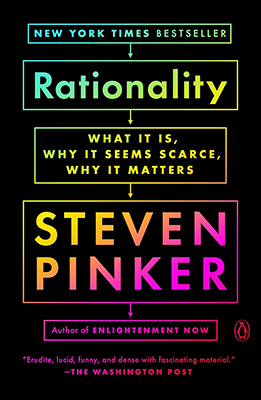Rationality
“Rationality: What It Is, Why It Seems Scarce, Why It Matters” by Steven Pinker is a book that delves into the concept of rationality, its importance in human cognition, and its implications for various aspects of society. Here’s a summary:
Introduction to Rationality: Pinker begins by defining rationality as the ability to think, reason, and make decisions based on evidence, logic, and critical thinking. He argues that rationality is essential for navigating the complexities of the modern world and solving problems effectively.
The Evolution of Rationality: Pinker explores the evolutionary origins of human rationality, tracing its development from the cognitive abilities of our ancestors to the sophisticated reasoning processes of contemporary humans. He discusses how natural selection favored traits that enhanced our capacity for rational thought and problem-solving.
Cognitive Biases and Irrationality: Pinker examines the cognitive biases and heuristics that can lead to irrational decision-making. He discusses phenomena such as confirmation bias, availability heuristic, and overconfidence, highlighting their impact on individual behavior and societal outcomes.
The Rationality Wars: Pinker addresses debates and controversies surrounding the concept of rationality, including critiques from various academic disciplines such as psychology, economics, and philosophy. He argues for a multidisciplinary approach to understanding rationality that incorporates insights from diverse fields.
Rationality in Practice: Pinker discusses the application of rationality in everyday life, including domains such as education, politics, and public policy. He emphasizes the importance of teaching critical thinking skills and fostering a culture that values evidence-based reasoning.
Rationality and Morality: Pinker explores the relationship between rationality and morality, arguing that rational decision-making can lead to more ethical outcomes by promoting empathy, fairness, and cooperation. He discusses ethical dilemmas and the role of rational deliberation in resolving them.
Rationality and Progress: Pinker examines the role of rationality in driving human progress and innovation. He discusses historical examples of rational thinking leading to scientific discoveries, technological advancements, and social reforms that have improved human well-being.
Challenges to Rationality: Pinker identifies challenges to rationality in the modern world, including misinformation, tribalism, and ideological extremism. He discusses strategies for combating irrationality, such as promoting media literacy, fostering open dialogue, and cultivating a culture of intellectual humility.
Conclusion: Pinker concludes by reaffirming the importance of rationality in addressing the complex challenges facing humanity and advocating for a renewed commitment to evidence-based reasoning, critical thinking, and rational discourse.
Overall, “Rationality: What It Is, Why It Seems Scarce, Why It Matters” provides a comprehensive exploration of the concept of rationality and its significance for individual and societal well-being. Pinker offers insights from psychology, philosophy, and other disciplines to shed light on how rational thinking can lead to better outcomes in various domains of human life.

